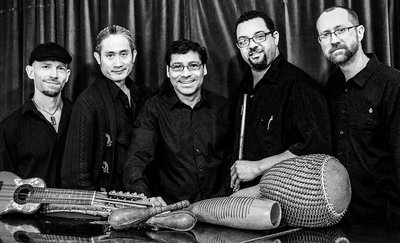
Thursday, April 17, at the Hult Center, the Eugene Symphony plays three 19th-century Euro-classics: Sibelius’s tone poem Finlandia, Schumann’s Piano Concerto (featuring the esteemed soloist Antonio Pompa-Baldi) and Mendelssohn’s Symphony No. 3. It’s a typical program for American orchestras that regard classical music as a historical museum of centuries-old artifacts from Europe.
You don’t see that retro, anti-American attitude in the schedules of dance and theater companies, which teem with offerings by contemporary American artists. And what if that attitude had prevailed when those great composers were alive? Mendelssohn et al. would have died in obscurity, and we’d never hear their music today either.
Unfortunately for those who regard classical music as a living tradition, too many backward-looking American orchestras have been dominated for decades by music from dead Europeans instead of living Americans, giving us few opportunities to hear homegrown 21st-century music in the classical tradition. This entire Eugene Symphony season, for example, contains a total of 18 minutes of classical music by living American composers, none by Oregonians. (Next season boasts 22 minutes of American music, more if you count Israeli-born composer Avner Dorman, who now teaches in the U.S.)
Five years ago, one Oregon composer, David Bernstein, decided to do something about this. Noting that Seattle, San Francisco, Los Angeles, New York and other cities boasted organizations dedicated to cultivating and performing the music of local composers, Bernstein recalled, “I thought ‘there’s a lot of really fine composers here. Why can’t Portland do this?’” He founded Cascadia Composers, which debuted in 2009 and quickly embraced composers from Eugene, who have provided some of the group’s finest music. The organization has become one of Oregon’s most vital classical music generators, both presenting and inspiring new music from the here and now. On Friday, April 11, Cascadia’s first Eugene concert, at Central Lutheran Church (18th & Potter), features chamber music by two of Eugene’s most vital and appealing composers: pianist Paul Safar (who runs Cherry Blossom Musical Arts with Nancy Wood, who’ll sing his “Spider”) and Mark Vigil, plus Bernstein’s “Three Summer Soundscapes” and works by more of Portland’s top composers, all played by first-rate Eugene and Portland musicians from various chamber and orchestral groups.
Speaking of Oregon music, on April 18, Douglas Detrick, one of the most promising composers to emerge from the UO in recent years, brings his Cartography Trio to The Jazz Station. The accomplished composer/trumpeter, who recently moved back to Portland from New York, joins two other rising young Portland jazzers, guitarist Bill Marsh and drummer Barra Brown, in a project that explores the intersection of improvisation, classical and American roots music. The opening duo, Seattle’s Syrinx Effect, blends improvised chamber music (trombone, sax) with electronics, ranging from ambient to noise. So sure, go hear great music of 19th-century Europe next week, but also check out the fascinating music our neighbors are creating here in the 21st century.
Still more contemporary chamber sounds happen April 16 at the UO’s Beall Concert Hall when the estimable new music ensemble Beta Collide invites other UO faculty musicians and guest musicians from Atlanta and Portland to perform music by recent Pulitzer Prize-winner David Lang, California composer Mark Applebaum, Frederic Rzewski, the UO’s own Pius Cheung and more.
Also at the UO Friday, April 11, Beall features the Seattle-born Latin American ensemble Matices, whose members include musicians from Mexico, Cuba, Chile and the U.S., in contemporary and traditional Brazilian, Cuban and other Latin music, including jazz. Still more world chamber music, as well as more music from UO composers, is featured in the always intriguing TaiHei Ensemble’s free April 21 concert at the UO’s Aasen-Hull Hall. That same night at Beall, the UO jazz faculty, led by Carl Woideck, celebrates the birthday of one of the greatest of all American composers and musicians with a concert of Duke Ellington’s music. Yes, though relegated to percentages in the single digits by too many American orchestras, American music — from yesterday and today — is worth experiencing live.